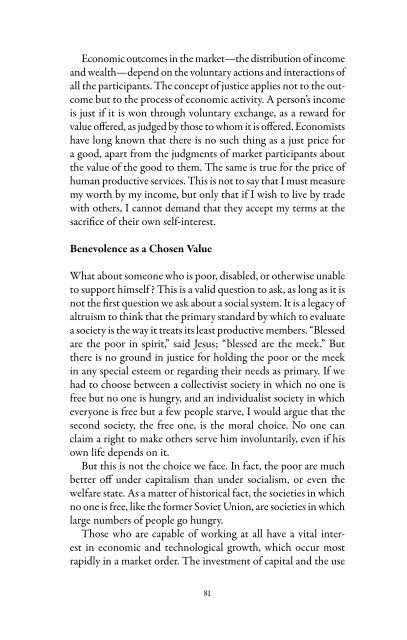The-Morality-of-Capitalism-PDF
The-Morality-of-Capitalism-PDF
The-Morality-of-Capitalism-PDF
You also want an ePaper? Increase the reach of your titles
YUMPU automatically turns print PDFs into web optimized ePapers that Google loves.
Economic outcomes in the market—the distribution <strong>of</strong> incomeand wealth—depend on the voluntary actions and interactions <strong>of</strong>all the participants. <strong>The</strong> concept <strong>of</strong> justice applies not to the outcomebut to the process <strong>of</strong> economic activity. A person’s incomeis just if it is won through voluntary exchange, as a reward forvalue <strong>of</strong>fered, as judged by those to whom it is <strong>of</strong>fered. Economistshave long known that there is no such thing as a just price fora good, apart from the judgments <strong>of</strong> market participants aboutthe value <strong>of</strong> the good to them. <strong>The</strong> same is true for the price <strong>of</strong>human productive services. This is not to say that I must measuremy worth by my income, but only that if I wish to live by tradewith others, I cannot demand that they accept my terms at thesacrifice <strong>of</strong> their own self-interest.Benevolence as a Chosen ValueWhat about someone who is poor, disabled, or otherwise unableto support himself ? This is a valid question to ask, as long as it isnot the first question we ask about a social system. It is a legacy <strong>of</strong>altruism to think that the primary standard by which to evaluatea society is the way it treats its least productive members. “Blessedare the poor in spirit,” said Jesus; “blessed are the meek.” Butthere is no ground in justice for holding the poor or the meekin any special esteem or regarding their needs as primary. If wehad to choose between a collectivist society in which no one isfree but no one is hungry, and an individualist society in whicheveryone is free but a few people starve, I would argue that thesecond society, the free one, is the moral choice. No one canclaim a right to make others serve him involuntarily, even if hisown life depends on it.But this is not the choice we face. In fact, the poor are muchbetter <strong>of</strong>f under capitalism than under socialism, or even thewelfare state. As a matter <strong>of</strong> historical fact, the societies in whichno one is free, like the former Soviet Union, are societies in whichlarge numbers <strong>of</strong> people go hungry.Those who are capable <strong>of</strong> working at all have a vital interestin economic and technological growth, which occur mostrapidly in a market order. <strong>The</strong> investment <strong>of</strong> capital and the use81


